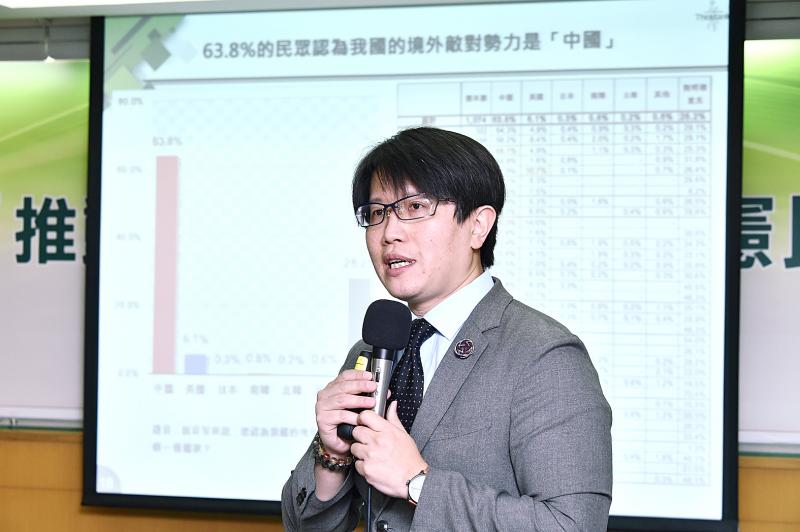Only 2 percent of respondents to a poll on constitutional amendments and national identity identified as Chinese, while 62.6 percent identified as Taiwanese, the Taiwan Thinktank said yesterday.
Legislators have proposed amendments to the Additional Articles of the Constitution (憲法增修條文), which would change the definition of the nation’s territory, remove the Taiwan Provincial Government as an entity, prioritize the use of “Taiwan” for national groups at international events, and remove restrictions on defining the national emblem, national flag and national anthem.
The poll showed that 80.5 percent of respondents agreed that the nation should participate as “Taiwan” at events organized by world bodies, while 12 percent disagreed.

Photo: Tu Chien-jung, Taipei Times
Ethnically, 62.6 percent identified as Taiwanese, while 2 percent identified as Chinese and 32.6 percent identified as both, the results showed.
If they were forced to choose between Taiwanese and Chinese, 86 percent chose Taiwanese and 6.3 percent selected Chinese, while 1.1 percent adamantly maintained that they are both.
When asked what name the nation should use at global events, 51.2 percent of respondents said “Taiwan,” while 33 percent said the “Republic of China,” 9.7 percent said “Chinese Taipei” (中華台北), 0.6 percent said “Zhongguo Taibei” (中國台北), and 2 percent said “Separate Customs Territory of Taiwan, Penghu, Kinmen, and Matsu,” while 0.1 percent said other names, 2.9 percent said they did not know or had no opinion, and 0.5 percent refused to answer.
Under a 1981 agreement with the International Olympic Committee, the Republic of China Olympic Committee was renamed the Chinese Taipei Olympic Committee.
In 2008, China used “Zhongguo Taibei” instead of “Chinese Taipei,” saying that there was no difference between them in Chinese.
To join the WTO in 2002, Taiwan used the name “Separate Customs Territory of Taiwan, Penghu, Kinmen and Matsu.”
The poll results show a consolidation of Taiwanese national identity as Beijing’s intimidation tactics further alienate those who identify as Chinese, Thinktank deputy executive-general Doong Sy-chi (董思齊) said.
Most Taiwanese aged 30 and younger view international affairs from the perspective of Taiwan being an independent political entity, a consensus that the proposed amendments to the act could harness, Doong said.
The poll showed that 82.1 percent of respondents agreed that the phrase “according to its existing national boundaries” could be changed to “the areas of Taiwan, Penghu, Kinmen and Matsu where the Constitution is observed,” while 5.2 percent did not agree.
However, most of the respondents agreed that the national territory did not include territory being administered by the People’s Republic of China.
Regarding the Taiwan Provincial Government, 68.8 percent of respondents saw no reason to keep it, while 18.5 percent supported its continuation.
The provincial government was set up in 1947, but declined after “province” was removed as a governmental tier in 1997. Despite being effectively disbanded, it cannot be officially removed without a constitutional amendment.
The results showed that 69.2 percent of respondents agreed that the Constitution should say more about Taiwan’s information technology and other high-tech industries, given that autocratic countries are seeking to infiltrate them and influence their development.
The poll, conducted from Tuesday to Thursday last week, collected 1,074 valid telephone interviews with people aged 18 and older, and has a confidence level of 95 percent and a margin of error of plus or minus-3 percentage points.

SECURITY: As China is ‘reshaping’ Hong Kong’s population, Taiwan must raise the eligibility threshold for applications from Hong Kongers, Chiu Chui-cheng said When Hong Kong and Macau citizens apply for residency in Taiwan, it would be under a new category that includes a “national security observation period,” Mainland Affairs Council (MAC) Minister Chiu Chui-cheng (邱垂正) said yesterday. President William Lai (賴清德) on March 13 announced 17 strategies to counter China’s aggression toward Taiwan, including incorporating national security considerations into the review process for residency applications from Hong Kong and Macau citizens. The situation in Hong Kong is constantly changing, Chiu said to media yesterday on the sidelines of the Taipei Technology Run hosted by the Taipei Neihu Technology Park Development Association. With

CARROT AND STICK: While unrelenting in its military threats, China attracted nearly 40,000 Taiwanese to over 400 business events last year Nearly 40,000 Taiwanese last year joined industry events in China, such as conferences and trade fairs, supported by the Chinese government, a study showed yesterday, as Beijing ramps up a charm offensive toward Taipei alongside military pressure. China has long taken a carrot-and-stick approach to Taiwan, threatening it with the prospect of military action while reaching out to those it believes are amenable to Beijing’s point of view. Taiwanese security officials are wary of what they see as Beijing’s influence campaigns to sway public opinion after Taipei and Beijing gradually resumed travel links halted by the COVID-19 pandemic, but the scale of

A US Marine Corps regiment equipped with Naval Strike Missiles (NSM) is set to participate in the upcoming Balikatan 25 exercise in the Luzon Strait, marking the system’s first-ever deployment in the Philippines. US and Philippine officials have separately confirmed that the Navy Marine Expeditionary Ship Interdiction System (NMESIS) — the mobile launch platform for the Naval Strike Missile — would take part in the joint exercise. The missiles are being deployed to “a strategic first island chain chokepoint” in the waters between Taiwan proper and the Philippines, US-based Naval News reported. “The Luzon Strait and Bashi Channel represent a critical access

Pope Francis is be laid to rest on Saturday after lying in state for three days in St Peter’s Basilica, where the faithful are expected to flock to pay their respects to history’s first Latin American pontiff. The cardinals met yesterday in the Vatican’s synod hall to chart the next steps before a conclave begins to choose Francis’ successor, as condolences poured in from around the world. According to current norms, the conclave must begin between May 5 and 10. The cardinals set the funeral for Saturday at 10am in St Peter’s Square, to be celebrated by the dean of the College